White Paper
A Self-Care White Paper: supporting the delivery of the NHS Long Term Plan
The coronavirus pandemic has highlighted the importance of self-care both to individuals and to the NHS as a whole, as people have been urged to treat their own symptoms wherever possible. Many who would previously have sought a GP appointment or visited A&E for a self-treatable condition have taken the decision to care for themselves safely and appropriately.
We want to see this shift in emphasis and behaviour embedded into our health system through policy changes that will encourage self-care. This includes the wider adoption and promotion of digital resources to improve access to reliable information and advice about self-care.
PAGB defines self-care as the actions people take for themselves and their families to:
Self-care is not no care and it is not necessarily practised in isolation. It may involve support and advice from others, such as expert pharmacy teams.
PAGB has long argued in favour of measures to prioritise self-care and overcome the barriers that deter people from practising it (see below). These goals are at the heart of our five-year strategy to 2025.
We are working with PAGB members, organisations across the health care sector and policymakers to drive progress towards a national self-care strategy.
PAGB is calling for the 2020s to be the decade of self care
| Self-care empowers people, enabling them to treat the symptoms of minor ailments appropriately and effectively. | |
| Self-care protects vital NHS resources by reducing the number of unnecessary GP appointments and A&E attendances. | |
| Self-care narrows health inequalities and improves outcomes by equipping people across all socioeconomic groups with the tools to treat themselves effectively and appropriately where possible. |
Before the coronavirus outbreak, there were an estimated 18 million GP appointments and 3.7 million A&E visits every year for conditions which people could have treated themselves or for which a pharmacist should have been the first port of call.
The cost to the NHS, along with that of unnecessary prescriptions for products which could be bought over the counter, is estimated by PAGB at £1.5 billion a year.
Alongside our overarching call for a national strategy to facilitate the development of self-care policies, we are working with stakeholders towards a series of goals to encourage and embed effective, appropriate self-care.
Our 2019 Self-Care White Paper, which has been updated to reflect the impact of Covid-19, sets out in more detail the potential benefits of implementing our recommendations and how they can support delivery of the NHS Long Term Plan.
Our report on the Future of the NHS focuses on the importance of self-care in the context of Covid-19. It shines a spotlight on the positive steps taken by the NHS in response to the pandemic and calls for these changes to be embraced in the long term.
Together with partners from across the pharmacy and health sector, we’ve published a blueprint for a national strategy to show policymakers what such a strategy could look like and how it could be developed. Download Realising the potential. Developing a blueprint for a self-care strategy for England. Find out more at www.selfcarestrategy.org.
We believe that self-care should be an integral part of the primary care pathway. Download our Self-care pathway infographic to see the optimal self-care journey to ensure people are able to access the right advice and treatment at the right time.

A Self-Care White Paper: supporting the delivery of the NHS Long Term Plan
PAGB supports and collaborates with our international colleagues in the promotion of self-care on a global level. PAGB’s self-care policy priorities are addressed in the Global Self-Care Federation’s Global Self-care Readiness Index – an in-depth analysis of self-care data in countries around the world.
The Index is a practical tool to help policymakers better understand and recognise the enablers of self-care: stakeholder support; consumer empowerment; health policy; and the regulatory environment.
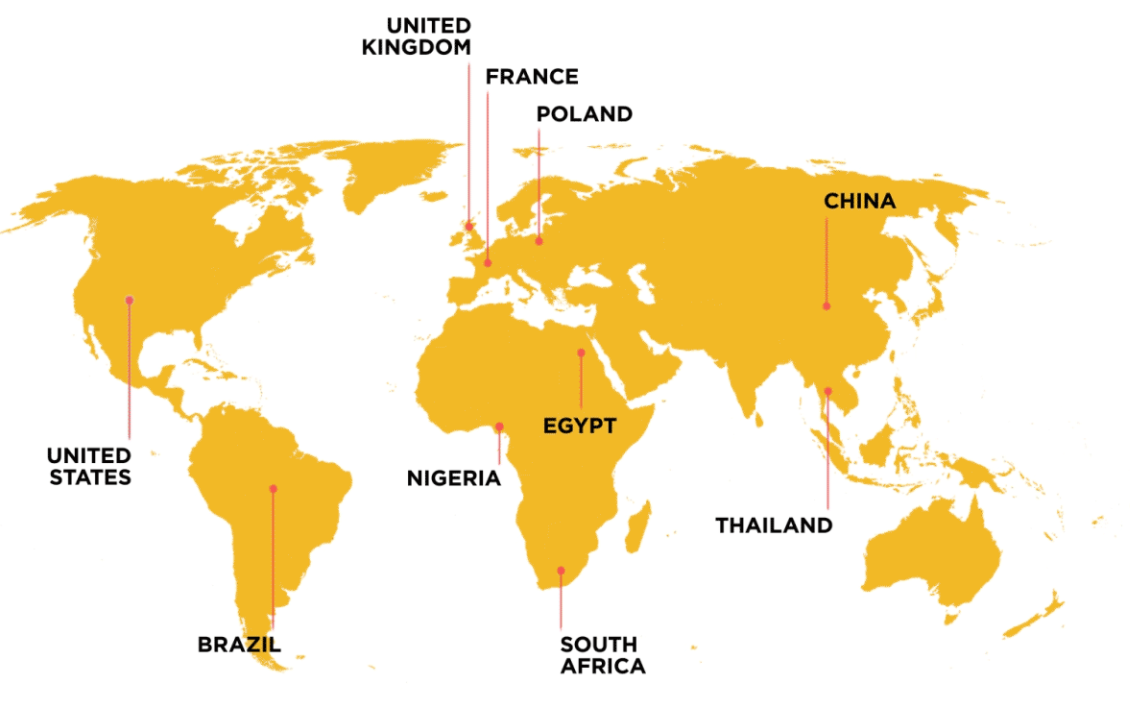
There are more than 11,600 community pharmacists in England alone. Overall, almost nine out of ten people (89%) live within a 20-minute walk of a community pharmacy. In the most deprived areas of the country, that figure rises to 99%.
Access to pharmacists’ expertise and advice has the potential to transform individuals’ approach to self-care.
PAGB recommends that:

PAGB is calling for a ‘digital first’ approach to embed the shift towards online resources that has been accelerated by the coronavirus pandemic.
Read more about opportunities for digital self-care in our policy paper: ‘Self-care and technology: Harnessing the potential of technology to transform self-care’
We recommend:

Digital Self-Care Audit: In November 2020, PAGB published an audit of online platforms where people commonly access information about managing their health in England to analyse what information is available and how accessible it is. PAGB’s findings are published in a ‘Digital Self-Care Audit’ in which we make three key recommendations for how recent advancements across digital platforms and remote services during the pandemic can be harnessed to lock-in a longer-term shift towards self-care.
Education and access to reliable sources of information can enhance skills in self-care, just as in other areas of knowledge.
PAGB recommends that:

Our self-care goals draw on our research demonstrating the value of self-care and exploring public attitudes towards it.
In 2016, we published our first major report on the issue, Self-Care Nation, based on a survey of more than 5,000 people. The vast majority of respondents acknowledged the importance of taking responsibility for their own health, yet one third said they would seek a GP appointment as their first option for advice about a minor health condition.
A second survey of 2,000 people, published in 2017, underlined this gap between people’s desire to self-care and their confidence in their ability to do so. A quarter of respondents told us they needed more education in identifying and managing common self-treatable conditions.
In June 2021, PAGB ran a UK-wide survey of more than 2,000 people asking people about their attitudes to self-care and accessing health services in the 12 months to June 2021, when coronavirus-related lockdown measures were in force to varying degrees.
In 2021, after a year living with the pandemic, 47% of respondents said they turned to their local pharmacist for ‘initial advice or medication’ for a self-treatable condition – up from 37% in 2020.
Our survey also found that in 2021, more than half of respondents (55%) believe pharmacists should be able to update people’s medical records while one in two (50%) agreed they should have the right to view medical records.
View and download a report of the 2021 results here.
This research was a follow up to our 2020 self-care survey of over 2000 adults in the UK, which showed that people’s experience of needing to self-care during the first coronavirus lockdowns had led to a shift in attitudes on where to get support for self-treatable conditions. Our 2020 research found:
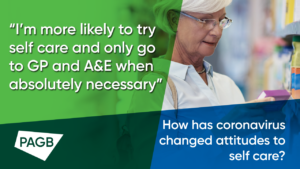 |
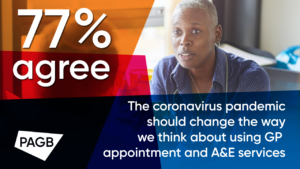 |
|
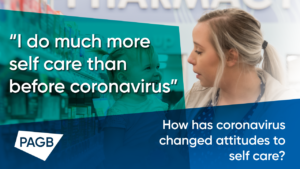 |
The results demonstrated a unique opportunity to cement positive changes in attitudes to self-care and in the way people use the NHS, as we argued in our written evidence to the House of Commons Health and Social Care Select Committee inquiry, Delivering Core NHS and Care Services During the Pandemic and Beyond.
PAGB is working with stakeholders across healthcare and industry to move self-care up the agenda.
In October 2019 and February 2020 we brought together a round table group to discuss the role of healthcare professionals in encouraging and supporting self-care. The resulting Clinical Consensus Statement on Self-Care has been endorsed by the Royal College of Nursing, NHS Clinical Commissioners, NPA (the National Pharmacy Association), CCA (the Company Chemists Association), PSNC (the Pharmaceutical Services Negotiating Committee), AIMp (the Association of Independent Multiple Pharmacies) and the Self-Care Forum. It was updated in October 2020 to reflect the impact of COVID-19 and stress the importance of embedding self-care policies to support people to self-care for self-treatable conditions.
The next step on this journey was to work together to develop a blueprint for a comprehensive national self-care strategy to support the introduction of self-care policies throughout the NHS in England.
Together, NHS Clinical Commissioners, RCN, NAPC, NPA, CCA, AIMp, RPS, Self Care Forum and PAGB published ‘Realising the potential. Developing a blueprint for a self-care strategy for England‘ in October 2021. Find out more at our dedicated microsite www.selfcarestrategy.org.
We support Self Care Week in November, which is spearheaded annually by the Self Care Forum, with whom we share many goals, and Stay Well This Winter, the campaign by Public Health England to encourage self-care measures during the colder months of the year.
We are involved in the drive to raise awareness of the risks of unnecessary prescription of antibiotics, backing the Antibiotic Guardian campaign, World Antibiotic Awareness Week and the European Antibiotics Awareness Day
We are members of AESGP (the Association of the European Self-Care Industry) and the Global Self-Care Federation, sharing global insights into the way self-care is perceived and practised around the world.
In September 2020, PAGB CEO Michelle Riddalls was among those leading a discussion hosted by the GSCF into self-care in Africa during the Covid-19 pandemic.
Share your views and join us in promoting the importance of self-care:
| Contact us | Follow us on Twitter | Join our network on LinkedIn |
Realising the potential. Developing a self-care strategy for England (October 2021)
Self-care survey summary of results (2020); (2021)
The Future of the NHS: self-care during and beyond the Covid-19 pandemic
A clinical consensus statement on self-care (updated October 2020)
Overcoming the barriers to self-care
Self-care and technology: Harnessing the potential of technology to transform self-care
Self-care Nation 2016: survey of self-care attitudes and behaviours
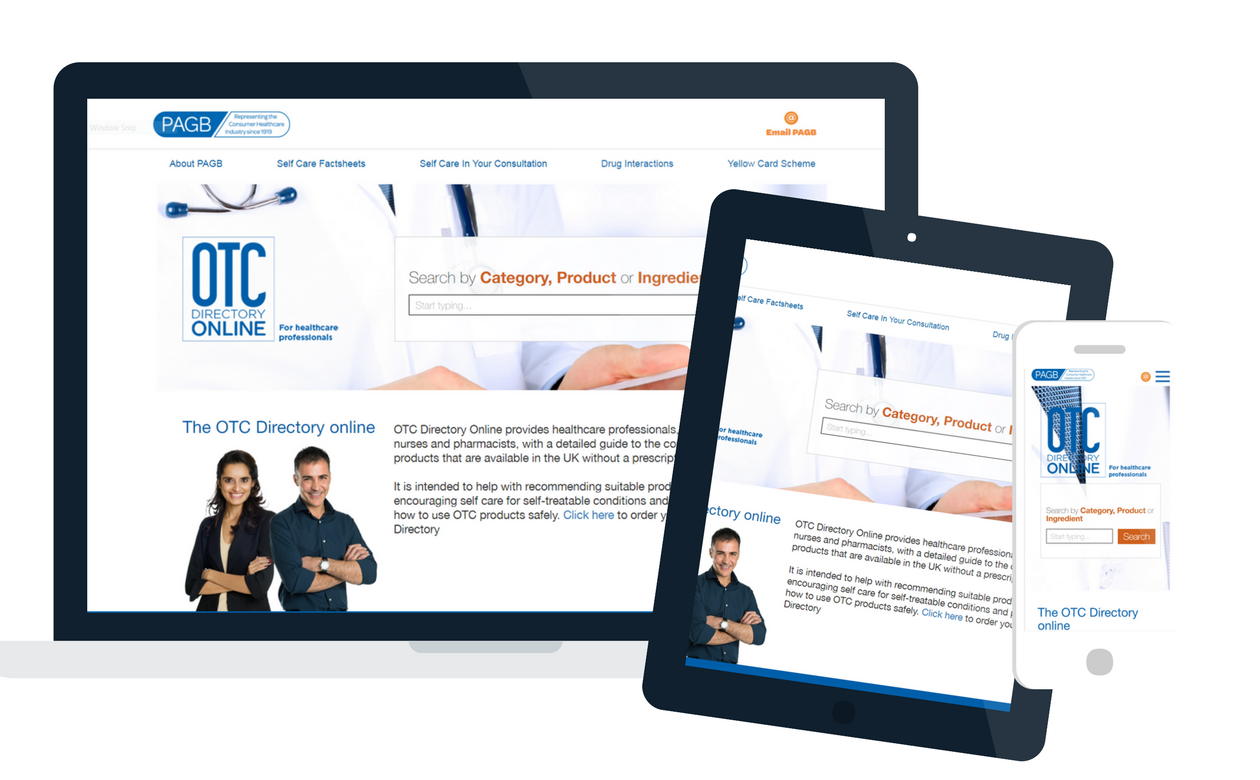
The OTC Directory is a free resource for healthcare professionals to help them support people to self-care for self-treatable conditions. Using the OTC Directory, GPs, pharmacists and other healthcare professionals can help advise people on what is available to help them manage symptoms, and help give them the confidence to self-care in the future.